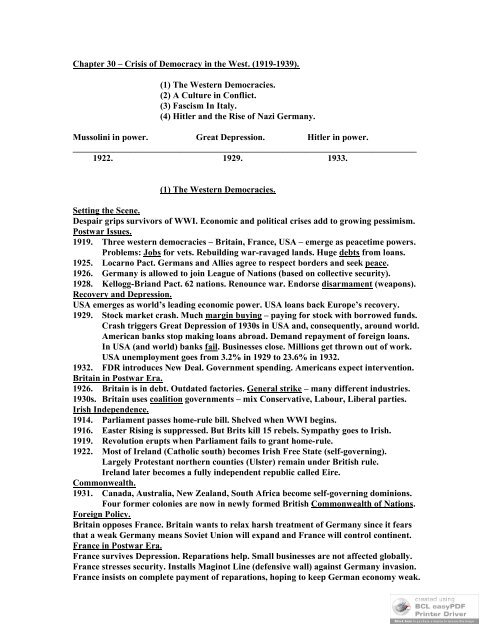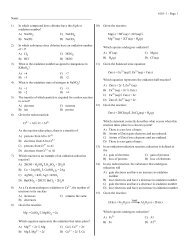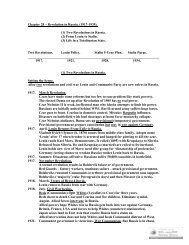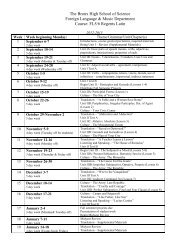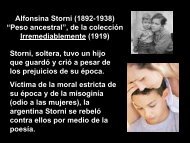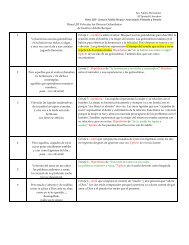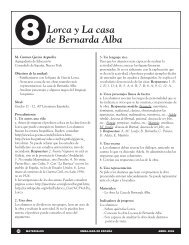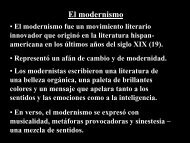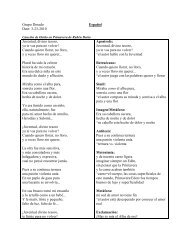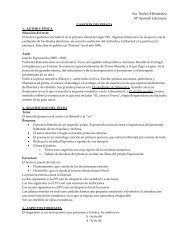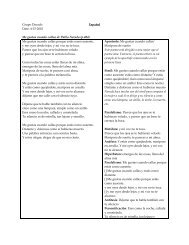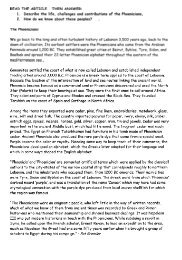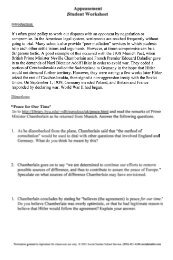Chapter 30 – Crisis of Democracy in the West. - The Bronx High ...
Chapter 30 – Crisis of Democracy in the West. - The Bronx High ...
Chapter 30 – Crisis of Democracy in the West. - The Bronx High ...
Create successful ePaper yourself
Turn your PDF publications into a flip-book with our unique Google optimized e-Paper software.
<strong>Chapter</strong> <strong>30</strong> <strong>–</strong> <strong>Crisis</strong> <strong>of</strong> <strong>Democracy</strong> <strong>in</strong> <strong>the</strong> <strong>West</strong>. (1919-1939).<br />
(1) <strong>The</strong> <strong>West</strong>ern Democracies.<br />
(2) A Culture <strong>in</strong> Conflict.<br />
(3) Fascism In Italy.<br />
(4) Hitler and <strong>the</strong> Rise <strong>of</strong> Nazi Germany.<br />
Mussol<strong>in</strong>i <strong>in</strong> power. Great Depression. Hitler <strong>in</strong> power.<br />
_____________________________________________________________________________<br />
1922. 1929. 1933.<br />
(1) <strong>The</strong> <strong>West</strong>ern Democracies.<br />
Sett<strong>in</strong>g <strong>the</strong> Scene.<br />
Despair grips survivors <strong>of</strong> WWI. Economic and political crises add to grow<strong>in</strong>g pessimism.<br />
Postwar Issues.<br />
1919. Three western democracies <strong>–</strong> Brita<strong>in</strong>, France, USA <strong>–</strong> emerge as peacetime powers.<br />
Problems: Jobs for vets. Rebuild<strong>in</strong>g war-ravaged lands. Huge debts from loans.<br />
1925. Locarno Pact. Germans and Allies agree to respect borders and seek peace.<br />
1926. Germany is allowed to jo<strong>in</strong> League <strong>of</strong> Nations (based on collective security).<br />
1928. Kellogg-Briand Pact. 62 nations. Renounce war. Endorse disarmament (weapons).<br />
Recovery and Depression.<br />
USA emerges as world’s lead<strong>in</strong>g economic power. USA loans back Europe’s recovery.<br />
1929. Stock market crash. Much marg<strong>in</strong> buy<strong>in</strong>g <strong>–</strong> pay<strong>in</strong>g for stock with borrowed funds.<br />
Crash triggers Great Depression <strong>of</strong> 19<strong>30</strong>s <strong>in</strong> USA and, consequently, around world.<br />
American banks stop mak<strong>in</strong>g loans abroad. Demand repayment <strong>of</strong> foreign loans.<br />
In USA (and world) banks fail. Bus<strong>in</strong>esses close. Millions get thrown out <strong>of</strong> work.<br />
USA unemployment goes from 3.2% <strong>in</strong> 1929 to 23.6% <strong>in</strong> 1932.<br />
1932. FDR <strong>in</strong>troduces New Deal. Government spend<strong>in</strong>g. Americans expect <strong>in</strong>tervention.<br />
Brita<strong>in</strong> <strong>in</strong> Postwar Era.<br />
1926. Brita<strong>in</strong> is <strong>in</strong> debt. Outdated factories. General strike <strong>–</strong> many different <strong>in</strong>dustries.<br />
19<strong>30</strong>s. Brita<strong>in</strong> uses coalition governments <strong>–</strong> mix Conservative, Labour, Liberal parties.<br />
Irish Independence.<br />
1914. Parliament passes home-rule bill. Shelved when WWI beg<strong>in</strong>s.<br />
1916. Easter Ris<strong>in</strong>g is suppressed. But Brits kill 15 rebels. Sympathy goes to Irish.<br />
1919. Revolution erupts when Parliament fails to grant home-rule.<br />
1922. Most <strong>of</strong> Ireland (Catholic south) becomes Irish Free State (self-govern<strong>in</strong>g).<br />
Largely Protestant nor<strong>the</strong>rn counties (Ulster) rema<strong>in</strong> under British rule.<br />
Ireland later becomes a fully <strong>in</strong>dependent republic called Eire.<br />
Commonwealth.<br />
1931. Canada, Australia, New Zealand, South Africa become self-govern<strong>in</strong>g dom<strong>in</strong>ions.<br />
Four former colonies are now <strong>in</strong> newly formed British Commonwealth <strong>of</strong> Nations.<br />
Foreign Policy.<br />
Brita<strong>in</strong> opposes France. Brita<strong>in</strong> wants to relax harsh treatment <strong>of</strong> Germany s<strong>in</strong>ce it fears<br />
that a weak Germany means Soviet Union will expand and France will control cont<strong>in</strong>ent.<br />
France <strong>in</strong> Postwar Era.<br />
France survives Depression. Reparations help. Small bus<strong>in</strong>esses are not affected globally.<br />
France stresses security. Installs Mag<strong>in</strong>ot L<strong>in</strong>e (defensive wall) aga<strong>in</strong>st Germany <strong>in</strong>vasion.<br />
France <strong>in</strong>sists on complete payment <strong>of</strong> reparations, hop<strong>in</strong>g to keep German economy weak.
(2) A Culture <strong>in</strong> Conflict.<br />
Sett<strong>in</strong>g <strong>the</strong> Scene.<br />
<strong>West</strong>ern culture experiences great changes <strong>in</strong> years follow<strong>in</strong>g World War I.<br />
New Views <strong>of</strong> <strong>the</strong> Universe.<br />
Ancient Greek view <strong>of</strong> atom accepted for centuries. Scientists show atom is more complex.<br />
Radioactivity.<br />
1900s. Marie Curie (1867-1934). Polish-French. She experiments with radioactivity.<br />
F<strong>in</strong>ds atoms <strong>of</strong> radium and uranium spontaneously release charged particles.<br />
Discovers atoms <strong>of</strong> one element could change <strong>in</strong>to atoms <strong>of</strong> ano<strong>the</strong>r element.<br />
W<strong>in</strong>s two Nobel prizes: Physics (1903) with husband; Chemistry (1911) alone.<br />
Relativity.<br />
1905. Albert E<strong>in</strong>ste<strong>in</strong> (1879-1955). German-American. Advances ‘<strong>The</strong>ory <strong>of</strong> Relativity.’<br />
Argues that measurements <strong>of</strong> time and space are not absolute, some unknown.<br />
Challenges Newton who compared universe to a mach<strong>in</strong>e runn<strong>in</strong>g on absolutes.<br />
E<strong>in</strong>ste<strong>in</strong> ideas are unsettl<strong>in</strong>g <strong>in</strong> that universe whirls beyond human reason.<br />
Prob<strong>in</strong>g <strong>the</strong> M<strong>in</strong>d.<br />
1885. Sigmund Freud (1856-1939). Austrian. Neurologist. Pioneers psychoanalysis.<br />
Suggests subconscious m<strong>in</strong>d drives much human behavior.<br />
Indicates people learn morality and reason that help repress powerful urges.<br />
Tension between urges and reason causes psychological illness, physical symptoms.<br />
Uses ‘free association’ <strong>in</strong> lieu <strong>of</strong> hypnosis <strong>in</strong> vogue. Also challenges faith <strong>in</strong> reason.<br />
Modern Art and Architecture.<br />
Artists reject tradition <strong>of</strong> reproduc<strong>in</strong>g reality for o<strong>the</strong>r dimensions <strong>of</strong> color, l<strong>in</strong>e, shape.<br />
Henri Matisse outrages public with bold color and distortion. Fauves or Wild Beasts.<br />
New Directions <strong>in</strong> Pa<strong>in</strong>t<strong>in</strong>g.<br />
Cubism. Spanish Picasso, French Braque break 3-D objects <strong>in</strong>to separate shapes.<br />
Abstract. Russian Kad<strong>in</strong>sky, German Klee pa<strong>in</strong>t no recognizable subject matter.<br />
Dada. French Arp, German Ernst shock, disturb. Revolt aga<strong>in</strong>st civilization.<br />
Word ‘dada’ means hobby horse <strong>in</strong> French: movement implies nonsense.<br />
Surrealism. Spanish Dali uses images <strong>of</strong> melt<strong>in</strong>g clocks to suggest Freud dream sate.<br />
Surrealism is outgrowth <strong>of</strong> cubism and dada to portray unconscious m<strong>in</strong>d.<br />
Architecture.<br />
Architects also reject tradition and develop new styles to match urbanized world.<br />
<strong>The</strong> Bauhaus school <strong>in</strong> Germany blends science and technology with design.<br />
American architect, Frank Lloyd Wright, reflects Bauhaus: function determ<strong>in</strong>es design.<br />
<strong>The</strong> New Literature.<br />
1929. Remarque’s All Quiet on <strong>the</strong> <strong>West</strong>ern Front exposes horrors <strong>of</strong> modern warfare.<br />
A Loss <strong>of</strong> Faith.<br />
To many postwar authors WWI symbolizes <strong>the</strong> moral breakdown <strong>of</strong> western civilization.<br />
1922. T.S.Eliot. b. American. English poet. <strong>The</strong> Waste Land says modern world is empty.<br />
1926. Ernest Hem<strong>in</strong>gway. <strong>The</strong> Sun Also Rises shows rootless wander<strong>in</strong>gs <strong>of</strong> young people.<br />
Literature <strong>of</strong> <strong>the</strong> Inner M<strong>in</strong>d.<br />
1925. Virg<strong>in</strong>ia Woolf. Mrs. Dalloway novel experiments with ‘stream <strong>of</strong> consciousness.’<br />
1939, James Joyce. F<strong>in</strong>negans Wake explores m<strong>in</strong>d <strong>of</strong> hero asleep throughout <strong>the</strong> novel.<br />
A Chang<strong>in</strong>g Society.<br />
Many yearn to return to ‘normalcy’ after WWI but rapid social change makes that hard.<br />
New technologies create mass culture shared by millions <strong>in</strong> world’s developed countries.<br />
Radios br<strong>in</strong>g news, music, sports. 1920s is Jazz Age. Gertrude Ste<strong>in</strong> cites ‘lost generation.’<br />
Liberated women are flappers: bobbed hair, short skirts, unchaperoned dates. Charleston.
(3) Fascism <strong>in</strong> Italy.<br />
Sett<strong>in</strong>g <strong>the</strong> Scene.<br />
Many Italians angry with political and economic problems turn to fascism for solutions.<br />
Rise <strong>of</strong> Mussol<strong>in</strong>i.<br />
1919. Paris Peace Conference does not give Italy territory that ends up as Yugoslavia.<br />
Nationalists are outraged. Veterans face unemployment. Trade down. Taxes up.<br />
<strong>The</strong> government, split <strong>in</strong>to feud<strong>in</strong>g factions, is powerless to end <strong>the</strong> crisis.<br />
A Leader Emerges.<br />
1919. Benito Mussol<strong>in</strong>i (1883-1945). Blacksmith’s son. Was socialist <strong>in</strong> youth.<br />
Dur<strong>in</strong>g war he rejects socialism for <strong>in</strong>tense nationalism.<br />
Mussol<strong>in</strong>i organizes veterans and discontented Italians <strong>in</strong>to Fascist party.<br />
Lat<strong>in</strong> fasces <strong>–</strong> bundle <strong>of</strong> sticks wrapped around an axe <strong>–</strong> symbol <strong>of</strong> authority.<br />
Fiery speaker. Promises: end corruption, restore order, revive Roman greatness.<br />
Seiz<strong>in</strong>g Power.<br />
1922. Fascists announce <strong>in</strong> rally at Naples a “march on Rome” <strong>of</strong> tens <strong>of</strong> thousands.<br />
K<strong>in</strong>g Victor Emmanuel III fears civil war. Asks Mussol<strong>in</strong>i to be prime m<strong>in</strong>ister.<br />
Without fir<strong>in</strong>g a shot Mussol<strong>in</strong>i gets ‘legal’ appo<strong>in</strong>tment. Underm<strong>in</strong>es democracy.<br />
Mussol<strong>in</strong>i’s Italy.<br />
1925. Mussol<strong>in</strong>i assumes more power. Takes title ‘Il Duce’ mean<strong>in</strong>g ‘<strong>The</strong> Leader.’<br />
Suppresses rival parties. Muzzles <strong>the</strong> press. Rigs elections with Fascists <strong>in</strong>.<br />
Italy is <strong>in</strong> <strong>the</strong>ory a parliamentary democracy but <strong>in</strong> reality a dictatorship.<br />
Economic Policy.<br />
Economy is under state control to encourage growth and end worker conflicts.<br />
Unlike socialists, Mussol<strong>in</strong>i preserves capitalism <strong>in</strong> his so-called “corporate state.”<br />
Representatives <strong>of</strong> bus<strong>in</strong>ess, labor, government and Fascist party control economy.<br />
Social Policy.<br />
Individual is unimportant except as a member <strong>of</strong> <strong>the</strong> state. “Believe, Obey, Fight.”<br />
Woman (homemaker) bear<strong>in</strong>g more than 14 children gets medal from Il Duce himself.<br />
What is Fascism?<br />
Mussol<strong>in</strong>i co<strong>in</strong>s term ‘fascism’ but fascists have no s<strong>in</strong>gle unify<strong>in</strong>g set <strong>of</strong> beliefs.<br />
Today, fascism is used to describe any authoritarian government not communist.<br />
Fascism has however basic features that start with its extreme nationalism.<br />
Fascism also glorifies action, violence, discipl<strong>in</strong>e, and bl<strong>in</strong>d loyalty to <strong>the</strong> state.<br />
Fascism rejects <strong>the</strong> Enlightenment faith <strong>in</strong> reason and ideas <strong>of</strong> equality or liberty.<br />
Fascism accepts Social Darw<strong>in</strong>ist idea <strong>of</strong> ‘survival <strong>of</strong> <strong>the</strong> fittest. Glorifies warfare.<br />
Compared to Communism.<br />
Fascists are <strong>the</strong> sworn enemies <strong>of</strong> both socialists and communists.<br />
While communists hope for <strong>in</strong>ternational changes, fascists pursue nationalist goals.<br />
Fascists ally with bus<strong>in</strong>ess leaders, wealthy landowners; Communists with workers.<br />
Despite differences fascism and communism impose totalitarianism <strong>in</strong> hard times.<br />
Totalitarian Rule.<br />
Mussol<strong>in</strong>i builds <strong>the</strong> first totalitarian state that becomes a model for o<strong>the</strong>rs.<br />
Totalitarian states (Italy, Germany, Russia) share basic features: (1) s<strong>in</strong>gle-party<br />
dictatorship, (2) state control <strong>of</strong> economy, (3) use <strong>of</strong> police spies and terror, (4) media<br />
censorship, (5) school <strong>in</strong>doctr<strong>in</strong>ation, (6) unquestion<strong>in</strong>g obedience to a s<strong>in</strong>gle leader.<br />
Appeal.<br />
Mussol<strong>in</strong>i projects a sense <strong>of</strong> power and confidence dur<strong>in</strong>g time <strong>of</strong> disorder and despair.<br />
Mussol<strong>in</strong>i <strong>in</strong>itially gets good press. Admirers say “he got <strong>the</strong> tra<strong>in</strong>s runn<strong>in</strong>g on time.”<br />
Only later, when he tries foreign conquests, do <strong>the</strong> detractors take over.
(4) Hitler and Rise <strong>of</strong> Nazi Germany.<br />
Sett<strong>in</strong>g <strong>the</strong> Scene.<br />
<strong>The</strong> Nazis uses terror, repression and one-party rule to establish a totalitarian state.<br />
1923. Adolph Hitler tries to follow Mussol<strong>in</strong>i’s ‘march on Rome’ example.<br />
His coup fails. He is jailed. Yet <strong>in</strong> a decade his bid for power is successful.<br />
<strong>The</strong> Weimar Republic.<br />
1919. German leaders draft a constitution <strong>in</strong> city <strong>of</strong> Weimar. Establish new government.<br />
New democratic government is known as Weimar Republic.<br />
Parliamentary system is led by a chancellor or prime m<strong>in</strong>ister.<br />
Struggles <strong>of</strong> <strong>the</strong> Republic.<br />
Government led by moderate democratic socialists has critics on both left and right.<br />
Communists (left) demand radical changes like those Len<strong>in</strong> had brought to Russia.<br />
Conservatives (right) attack government as too liberal, weak. Want a Bismarck, Kaiser.<br />
All Germans blame Weimar Republic for hated Versailles treaty: heavy reparations.<br />
Inflation.<br />
1923. Germany falls beh<strong>in</strong>d <strong>in</strong> pay<strong>in</strong>g reparations. Government pr<strong>in</strong>ts paper money.<br />
Inflation spiral. 100 marks (July 1922) equals 944,000 marks (August 1923).<br />
Salaries rise dramatically. But prices rise faster. Sav<strong>in</strong>gs are wiped out.<br />
Recovery and Collapse.<br />
1924. Dawes Plan. USA ga<strong>in</strong>s British and French approval to reduce reparations.<br />
France withdraws from Ruhr, American loans help Germany economy recover.<br />
1929. Great Depression. Miseries <strong>of</strong> 1923 return.<br />
Adolf Hitler.<br />
Adolf Hitler (1889-1945) is born <strong>in</strong> Austria, <strong>High</strong> school dropout. Moves to Germany.<br />
1919. Hitler (ex-soldier) jo<strong>in</strong>s a small group <strong>of</strong> right-w<strong>in</strong>g extremists.<br />
1920. He becomes leader <strong>of</strong> group. National Socialist German Workers or Nazi party.<br />
Me<strong>in</strong> Kampf.<br />
1923. Hitler’s failed coup lands him <strong>in</strong> jail. He writes Me<strong>in</strong> Kampf or My Struggle.<br />
Book is basis <strong>of</strong> Nazi ideology. Extreme Nationalism. Racism. Anti-Semitism.<br />
Germans belong to superior “master race.” Aryans are light-sk<strong>in</strong> Europeans.<br />
Jews (enemies) are not members <strong>of</strong> a religion but are <strong>of</strong> a separate race.<br />
Germany WWI loss: betrayal by conspiracy <strong>of</strong> Marxists, Jews, bad politicians.<br />
Germany must expand to ga<strong>in</strong> Lebenstraum or ‘liv<strong>in</strong>g space’ for its people.<br />
<strong>The</strong> Road to Power.<br />
1933. Hitler is elected chancellor. Conservatives (fear<strong>in</strong>g communists) turn to him.<br />
Hitler is master <strong>of</strong> Germany (<strong>the</strong> Fuhrer) with<strong>in</strong> a year. One-party rule.<br />
Hitler’s Third Reich.<br />
First Reich (empire) is medieval HRE. Second Reich is empire forged by Bismarck <strong>in</strong> 1871.<br />
Third Reich is Hitler’s new Germany that he says will dom<strong>in</strong>ate Europe for 1,000 years.<br />
Hitler repudiates (rejects) Treaty <strong>of</strong> Versailles. Schemes to unite Germany and Austria.<br />
Hitler launches large public works (as Brita<strong>in</strong> and USA did). Employment. Rearmament.<br />
Purg<strong>in</strong>g German Culture.<br />
Nazis condemn jazz. Glorify old German myths such as <strong>in</strong> operas <strong>of</strong> Richard Wagner.<br />
Nazis burn books like All Quiet on <strong>West</strong>ern Front that <strong>in</strong>sults German military.<br />
Nazis close Catholic schools. Muzzle Catholic and Lu<strong>the</strong>ran clergy.<br />
1938. Night <strong>of</strong> Broken Glass. Two-day riot. Young Jew shoots German diplomat.<br />
Hitler uses <strong>in</strong>cident as excuse to attack Jewish communities all over Germany.<br />
Aftermath.<br />
Jews are sent to concentration camps. Detention centers. ‘F<strong>in</strong>al solution’ follows.


